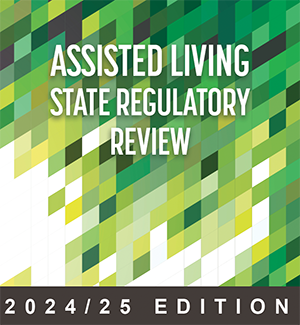 Each year, NCAL publishes the "Assisted Living State Regulatory Review," to summarize key selected state requirements for assisted living licensure or certification. For every state and the District of Columbia, this report includes information on preselected topics such as which state agency licenses assisted living, recent legislative and regulatory updates affecting assisted living, scope of care, limitations of services, staffing, and training - to name a few.
Each year, NCAL publishes the "Assisted Living State Regulatory Review," to summarize key selected state requirements for assisted living licensure or certification. For every state and the District of Columbia, this report includes information on preselected topics such as which state agency licenses assisted living, recent legislative and regulatory updates affecting assisted living, scope of care, limitations of services, staffing, and training - to name a few.
States use several different terms to refer to assisted living, such as residential care and personal care homes. This report includes requirements for those types of communities that offer seniors housing, supportive services, personal-centered assistance with activities of daily living, and some level of health care.
IMPORTANT NOTE: Beginning in 2025, NCAL will update the Regulatory Review for a select group of states quarterly to ensure the most up-to-date information. The following states have been updated as of March 2025: Alabama, Alaska, Arkansas, Colorado, Connecticut, Delaware, District of Columbia, Florida, Georgia, and Hawaii.